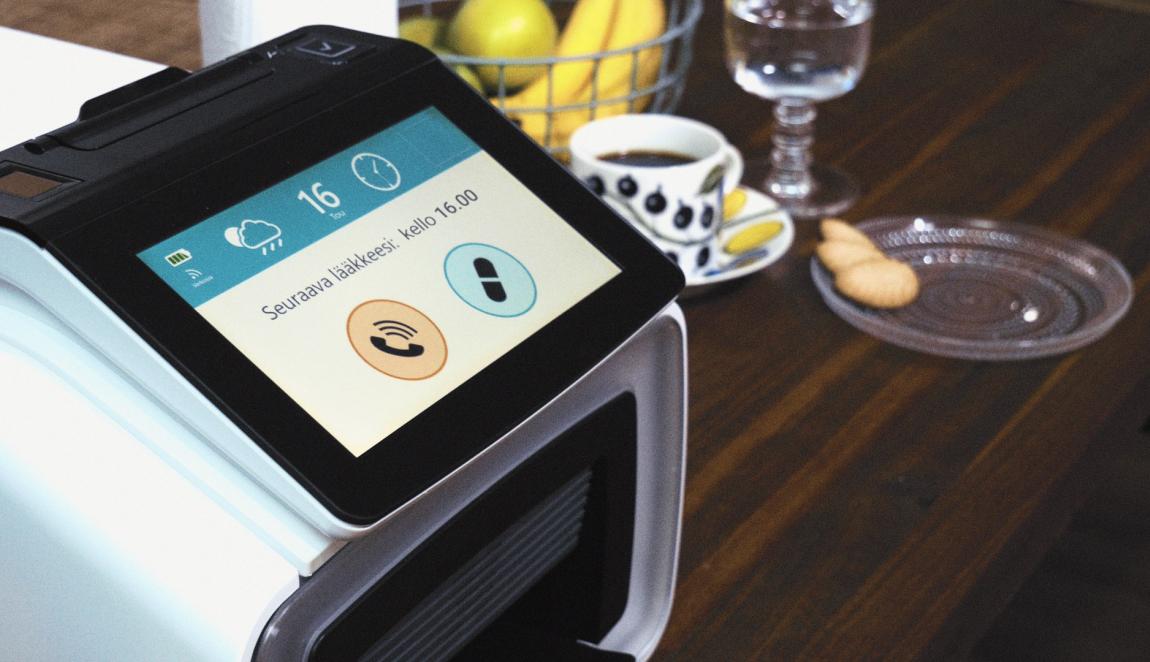
The mechanical distribution and administration of pharmaceuticals is evolving. Smila is a service that reminds the customer to take the medicine and dispenses it correctly. Living at home is therefore safer for senior citizens, and staff can focus on providing human care and communication. Tamro’s Smila care service, which is in pilot use, facilitates safe distribution of pharmaceuticals.
Why do we need mechanical distribution of pharmaceuticals at home?
Distribution of pharmaceuticals is an essential part of the everyday life of elderly people at home or in housing service units. In pharmacotherapy, it is important that medicines are taken according to plan and on time.. In general, the distribution of pharmaceuticals is the responsibility of a home care worker visiting an elderly person.
Home care workers have several customers and each customer visit includes several tasks. Medical treatment is only one of them, and human error can occur both in the distribution of pharmaceuticals into single doses and in the administration of them. A large proportion of the entries in the health care incident reporting are errors in medical treatment: the medicine has not been taken, its dosage has been wrong, or it has been taken at the wrong time. In cases like this, medical treatment is not carried out as planned.
Taking medications is often scheduled in the morning and evening. This creates congestion for home care workers: not all customers may be served on time in everyday life.
What new does the Smila care service bring to the everyday life of a citizen living at home?
Smila won't forget if a person forgets. The Smila device, a robot that speaks with a human voice, reminds us that now is the time to take the medicine. It also dispenses the right medicine bag and pre-opens it for a customer whose finger dexterity may be impaired. Tamro rents equipment for home care, which places them in the customers' apartments.
The mechanical dose delivery service has been in use for many years and has already contributed to improved safety. Smila is still a step forward from here, as it brings mechanical assistance all the way to the customer's home. Smila is, in a way, an additional service developed as an "extension" of this existing dose distribution.
The Smila device will be developed into a platform for wider services in the future. The idea is that the device can connect the user, relatives, and home care or other home care providers.
Does mechanical distribution of pharmaceuticals reduce human interaction?
No. It excludes human error and provides time for better interaction. Smila's most important contribution is safety: when the machine administers the medicines on time, the risk of forgetting or overdose is minimal.
When the distribution and dosing of medicines is handled mechanically, there is no need to slavishly try to adapt the home visits of home care customers to their medicine schedule. Instead of pharmaceutical service, home care staff can focus on what the machine can’t do: human encounter and interaction. The introduction of new technology provides an opportunity to rationalise the whole of pharmacotherapy.
How does the Smila care service improve the flow of information in pharmaceutical matters?
The process of pharmacotherapy involves several separate parties – it is a team sport where each party is necessary. The doctor prescribes the medicine, the pharmacy delivers the medicine, and home care dispenses them to the patient.
It is always possible that errors will occur in the flow of information or the information provided is incomplete. It is important to reassure these joints between different organisations. It is important to create practices that reduce the potential for error.
Home care monitors the effects of the medication and makes important decisions when assessing the customer's well-being and ability to function. Employee turnover is a daily occurrence in many home care units, and knowledge of pharmacotherapy issues may remain between different organisations. The flow of information is particularly crucial in the management of pharmacotherapy appropriate to the individual.
What experiences have been gained with the use of Smila?
Smila is in pilot use in home care in Jyväskylä and Lahti. The experiences from both are excellent. The safety of pharmacotherapy has improved and patients have been happy with the new service. Good feedback has been received from both home care workers and end users, i.e. home care customers.
Although it is a device, its human voice has even been experienced by some as sociable. The "Time to take your medication, please" prompt is a friendly reminder of an important thing. By the time the nurse arrives, the medication has already been taken care of, and one can focus on other care activities and socialising.



